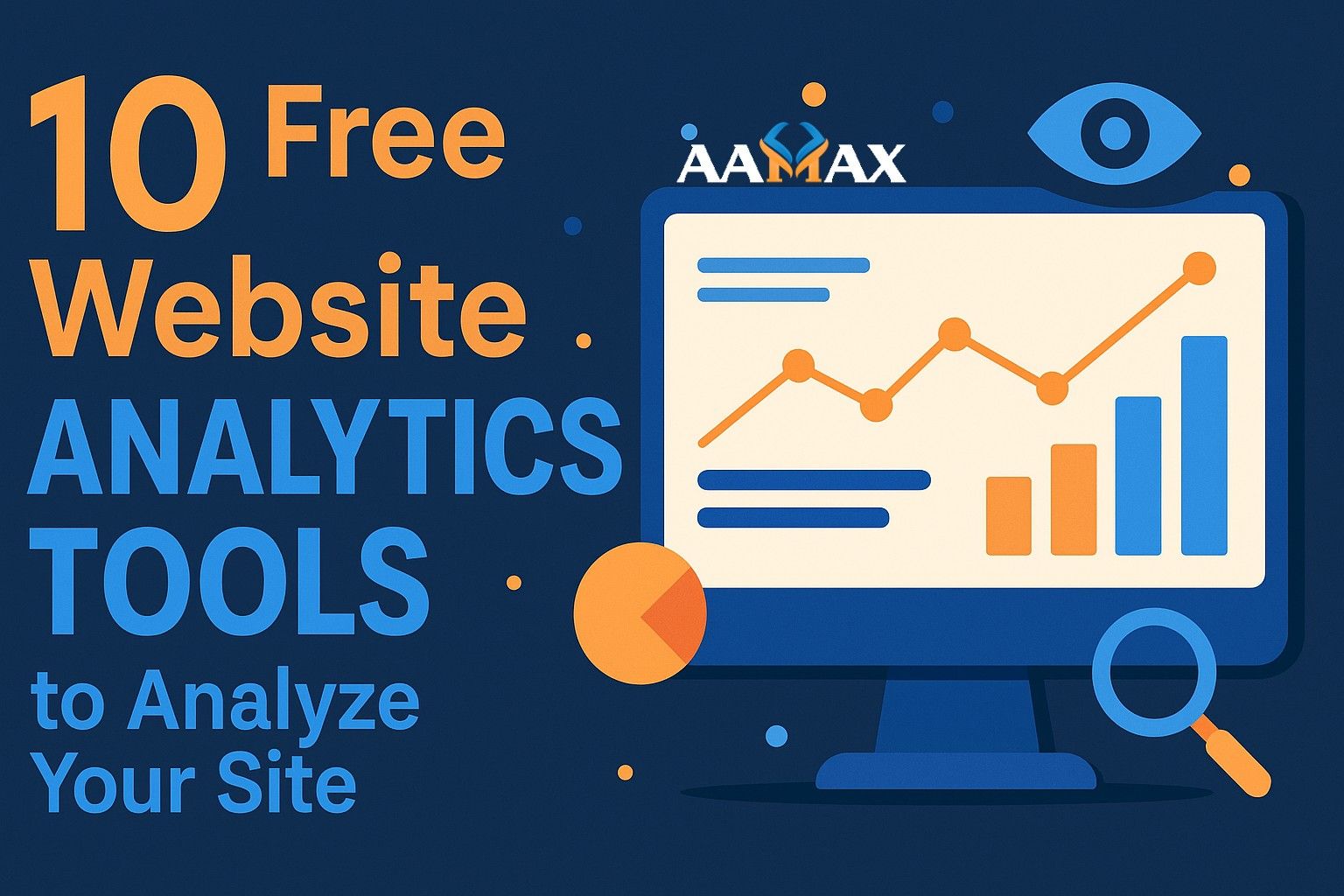
10 Free Website Analytics Tools to Analyze Your Site
Understanding how visitors interact with your website is essential to improving user experience, boosting conversions, and growing your business online. While premium analytics platforms offer robust features, many excellent tools are available at no cost. Whether you're a small business owner, marketer, or blogger, these free website analytics tools can give you the insights you need to make informed decisions.
In this guide, we’ll explore 10 powerful and completely free tools you can use to analyze your site’s performance, traffic sources, user behavior, and more.
1. Google Analytics
Best for: In-depth traffic and behavior analysis.
Google Analytics is the most popular web analytics tool on the planet — and for good reason. It provides comprehensive data on your full-service digital marketing agency including user demographics, device usage, bounce rate, average session duration, and real-time visitor data.
With Google Analytics 4 (GA4), you also get advanced event tracking, funnel analysis, and integration with Google Ads and Search Console. Although there’s a learning curve, its capabilities are unmatched in the free tool category.
Key Features:
- Real-time analytics
- User journey tracking
- Traffic source breakdown
- Goal setting and conversion tracking
2. Google Search Console
Best for: Monitoring search performance and indexing issues.
Google Search Console is a must-have tool for anyone looking to improve their site’s visibility in Google Search. It shows how your site performs in search results, including clicks, impressions, click-through rates (CTR), and keyword positions.
You can also check for indexing issues, mobile usability problems, and submit sitemaps directly to Google for better crawling.
Key Features:
- Keyword performance insights
- Index coverage reports
- Sitemap submission
- Mobile usability testing
3. Microsoft Clarity
Best for: Heatmaps and session replays.
Microsoft Clarity is a powerful behavioral analytics tool that provides heatmaps, session recordings, and user insights. You can see where users click, how far they scroll, and how they interact with your content in real-time.
The best part? It’s 100% free, with no traffic caps, and doesn’t slow down your website.
Key Features:
- Heatmaps for all pages
- Session replays
- Rage click and dead click tracking
- Performance dashboard
4. Matomo (On-Premise Version)
Best for: Privacy-focused analytics.
Matomo (formerly Piwik) is an open-source analytics platform that puts you in control of your data. The self-hosted version is completely free and offers features comparable to Google Analytics, including real-time data, goal tracking, and e-commerce analytics.
It's a great alternative for GDPR-conscious users who prefer data ownership.
Key Features:
- Full data ownership
- Custom dashboards
- Campaign tracking
- Privacy compliance tools
5. Statcounter
Best for: Real-time visitor tracking and traffic trends.
Statcounter is a beginner-friendly tool that offers real-time analytics, including visitor paths, location, device types, and referring links. It’s especially useful for identifying repeat visitors and tracking user journeys without complexity.
While advanced features require a paid plan, its free version provides plenty of useful data for smaller sites.
Key Features:
- Visitor path tracking
- Referrer and keyword analysis
- Returning visitor identification
- Exit link tracking
6. Clicky
Best for: Simple, real-time web analytics.
Clicky is an intuitive platform that offers real-time data, heatmaps, uptime monitoring, and goal tracking. It's a great alternative for users who find Google Analytics too complex.
The free plan includes up to 3,000 pageviews per day and supports up to 1 website.
Key Features:
- Real-time dashboard
- Heatmaps (by page, visitor, and segment)
- Uptime monitoring
- On-site analytics widget
7. Fathom Lite (Self-Hosted)
Best for: Lightweight and privacy-friendly analytics.
Fathom Lite is a free, open-source alternative to traditional analytics platforms. It’s simple, lightweight, and focused on user privacy — no cookies required. Since it’s self-hosted, it offers full data control, making it a great option for privacy advocates.
Key Features:
- Cookie-free tracking
- GDPR, PECR, and CCPA compliant
- Easy setup
- Fast-loading dashboard
8. Yandex Metrica
Best for: Behavior analysis and session recording.
Yandex Metrica is a feature-rich analytics tool from Russia’s largest search engine. It offers powerful features like session replays, heatmaps, and user behavior analysis. Unlike many competitors, it also includes form analytics and goal visualization.
Despite being less popular in Western markets, it's one of the most robust free tools available.
Key Features:
- Session recordings and heatmaps
- Form analysis
- Traffic quality metrics
- Custom reports
9. Open Web Analytics
Best for: Full control with open-source analytics.
Open Web Analytics (OWA) is another self-hosted analytics tool that gives you complete control of your data. It offers many of the same features as Google Analytics, including user tracking, click maps, and traffic source analysis.
Ideal for developers or businesses that prefer open-source solutions.
Key Features:
- Pageview and visitor tracking
- Heatmaps and clickstream tracking
- Campaign tracking
- Integration with WordPress and MediaWiki
10. Plausible (Self-Hosted Version)
Best for: Clean, privacy-first insights.
Plausible is a simple and privacy-friendly analytics platform. While the hosted version is paid, the self-hosted version is free and open-source. It's built for speed and clarity, offering a minimalist dashboard with all the essentials.
Perfect for users who want privacy-compliant analytics without the complexity.
Key Features:
- No cookies or personal data
- Lightweight script
- GDPR, CCPA, PECR compliant
- Real-time traffic reports
How to Choose the Right Analytics Tool
With so many great free options, how do you choose the right one for your website? Here are a few questions to consider:
1. What’s your technical expertise level?
Tools like Microsoft Clarity or Google Analytics are easy to set up, while self-hosted solutions like Matomo or Fathom Lite may require some technical knowledge.
2. Do you need real-time analytics?
If you want instant data on visitors, tools like Clicky, Statcounter, and Yandex Metrica are great picks.
3. Are privacy regulations a concern?
For GDPR-compliant tracking without cookies, consider tools like Plausible, Fathom Lite, or Matomo.
4. How much traffic do you get?
Some tools, like Clicky and Statcounter, have free tiers with traffic limits. Make sure the tool supports your volume.
Bonus Tip: Combine Tools for Deeper Insights
You don’t have to choose just one tool. For example, many users combine Google Analytics with Microsoft Clarity or Search Console for a more complete picture. Just make sure not to overload your site with too many tracking scripts, as that can slow down page load times.
Final Thoughts
Website analytics are essential for understanding how your audience interacts with your content, where your traffic comes from, and what improvements can be made. Fortunately, you don’t have to break the bank to gain access to world-class insights. From Google Analytics to open-source alternatives like Matomo or Plausible, there’s a free tool to suit every website owner’s needs.
Still unsure which analytics tools are right for your business or how to interpret the data effectively? Consider partnering with digital marketing professionals who can help you set up, customize, and make the most of your analytics stack.
Hire AAMAX for expert web development and digital marketing services. AAMAX is a full-service digital marketing agency offering SEO, web development, and strategic online growth services tailored to your business needs.
Unlock the full potential of your data and drive smarter decisions today.







